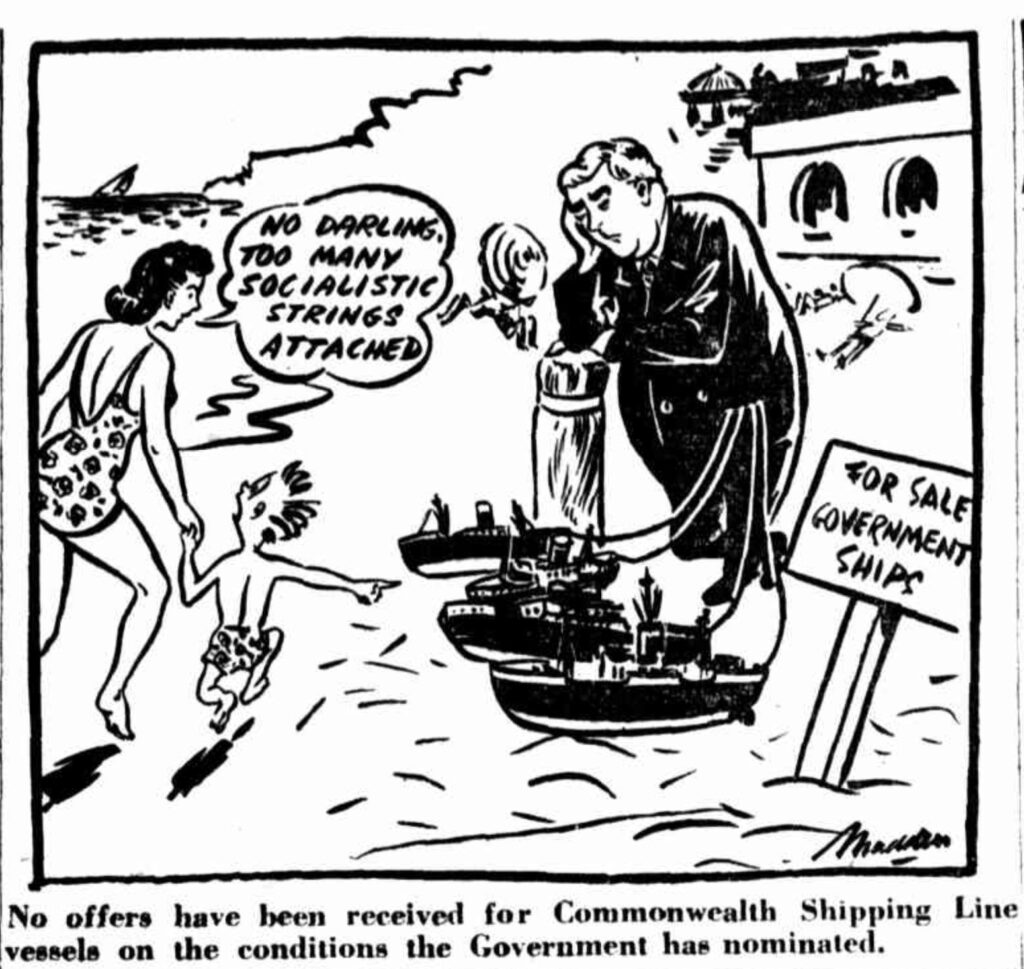On this day, 3 November 1952, Prime Minister Robert Menzies affirms his support for a plan to sell off the government owned Commonwealth Shipping Line. This move formed part of a wider program of ‘desocialisation’ – what would now be called privatisation – which recognised the enduring liberal view that there are many things that private enterprise is better at running than the state. Above all, there was a belief that competition and individual incentive produced better outcomes, and that these were impeded by state-run operations which inevitably became reliant on extra government assistance which was the inverse of an impulse towards innovation and efficiency.
Due to a comparatively recent liberalisation of the Australian economy, it is now often forgotten how far down the road towards a state-controlled command economy Australia once went. In 1905 the Australian Labor Party adopted the first form of its ‘socialist objective’, calling for the ‘nationalisation of monopolies and the extension of the industrial and economic functions of the state’. In subsequent years, Labor governments actively tried to pursue this objective, setting up state-owned bakeries, butchers, brickworks etc., all intended to compete with private enterprise. While constitutional limitations (and referendum defeats upholding those limitations) meant that much of this program was carried out at the state level, the federal government still became involved in running a state shipping line, whaling network, oil refineries, and radio infrastructure.
On coming to power in 1949, the Menzies Government decided to dismantle much of this system, and use the money raised from selling assets to invest in other nation building projects. In the 1950s, Commonwealth shares in Amalgamated Wireless Australasia Ltd (AWA) and Commonwealth Oil Refineries (COR) were sold off, as were the assets of the Australian Whaling Commission – a network of government-owned whaling stations dotting the Australian coast. Other sales included the Bell Bay aluminium smelter, which was bought by Rio Tinto.
The totemic head of this desocialisation program was the unprofitable Commonwealth Shipping Line, which Minister for Shipping George McLeay became determined to offload. The Labor Opposition was highly ideologically opposed to this move, and several times in Parliament accused the government of having secretly already signed a deal with a buyer. On the contrary, the Government was never able to find a someone who was willing to match the price they had in mind and agree to the conditions they wanted to attach, though some individual vessels were indeed offloaded.
George McLeay died in office in 1955, having never accomplished his goal. However his successor Shane Paltridge doubled down on the intention, rashly declaring to Cabinet that he would ‘have it sold within six months’. Once again, no buyer was forthcoming, and so Paltridge resolved ‘I can’t sell the line but I’ll take these bastards on and make it pay’. In 1956 he introduced legislation to completely restructure the enterprise, which was now referred to as the Australian National Line. Paltridge gave the ANL’s new director John Williams instructions that:
‘the fleet was to be run as a private enterprise show: that we would be expected to provide an adequate and efficient service … we need not look for any Government help or favour … as a final shot, he said that he wanted me to run the Line as if I had my own funds at risk and that if we paid a dividend of 6% on its capital and kept anything extra to build up the business it would be all right with him— “But just give us the money, Mister”.’
Paltridge and Williams were ultimately successful in making the ANL profitable, introducing important innovations such as the Princess of Tasmania, the first drive-on/drive-off passenger ship from the mainland to Tasmania (a successor of which continues to operate as the Spirit of Tasmania). While this success and other priorities ensured that the ANL was not sold during the Menzies era, in subsequent years its profitability once again waned. It would finally be privatised by the Howard Government in 1998, fulfilling a Liberal dream held for almost 50 years.
Further Reading:
Margot Harker, ‘Paltridge, Sir Shane Dunne’, The Biographical Dictionary of the Australian Senate, vol. 3, 1962-1983, University of New South Wales Press Ltd, Sydney, 2010, pp. 484-490.
Sign up to our newsletter
Sign up for our monthly newsletter to hear the latest news and receive information about upcoming events.


